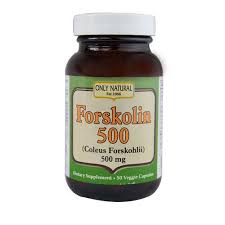What is Forskolin
Forskolin is an extract from the root of of Plectranthus barbatus, also known as Coleus Forskohlii, which is a medium sized plant native to India. In ancient human history, Ayurvedic healers made great use of this herb for the treatment of many health issues. Forskolin is a compound that is found in great concentration within the Coleus Forskohlii root. The roots of this plant have been ground up, eaten, and used in teas by Ayurvedic healers for centuries, but now isolated Forskolin supplements are readily available on the consumer market as standardized extracts. Forskolin has shown the ability to help manage many health conditions such as obesity, hormonal issues, heart health, and even help with allergies. As with all plants, there are many more compounds found within the Coleus Forskohlii than just Forskolin. For those adhering to more traditional herbal practices, teas made from the tuberous roots of this plant offer a more symbiotic blend of compounds. Modern research has shown that the active alkaloid Forskolin is by far the most beneficial compound for health purposes.

Forskolin has been touted as a miracle weight loss supplement by such personalities as Dr. Oz. Much of it’s popularity has been founded on the misunderstanding that it is some form of ‘magic’ pill that can be taken to lose weight no matter what. This, is categorically false—as are most claims by national personalities. That being said, Forskolin has shown marked ability to affect muscle/fat ratios in the body, regulate lipid levels, promote healthy hormonal levels, as well as affecting many other positive shifts in the body.
At it’s most fundamental level, forskolin is known to cause spikes in a chemical called cyclic adenosine monophosphate, or cAMP for short. This compound is involved in helping regulate many vital functions in your body, and has been known to offer benefits in the treatment and prevention of many major diseases. For a better understanding of how forskolin works, as well as why you should be mindful of your cAMP levels, let’s take a look at some of the functions that research has shown Forskolin to be effective in.
Forskolin Benefits
Forskolin is known to have many powerful benefits as a naturally-derived treatment for many health conditions. The stark association with weight loss is merely a recent side track that forskolin has taken, and offers many benefits towards your health. Clinical research on forskolin still somewhat sparse, and much of the conclusions found are indirect in nature. For example, cAMP levels as known to regulate many vital functions in the body, and forskolin is known to increase levels of available cAMP. So, these dots can be connected to suggest that forskolin may very well be able to impact the regulation of those many vital functions—through it’s regulation of cAMP.
Forskolin is regarded as being able treat high blood pressure, chest pain, allergies, eczema, obesity, IBS, urinary tract infections, ‘advanced’ cancer, and even erectile dysfunction in men
With a lack of more research to draw conclusions from, it’s a bit tough to say anything conclusively about forskolin—although many forskolin benefits are regarded. Forskolin is reported by many ‘authority’ sites such as WebMD as being useful in treating high blood pressure, chest pain, allergies, eczema, obesity, IBS, urinary tract infections, ‘advanced’ cancer, and even erectile dysfunction in men— with little citation. While you’ll find below that Forskolin does in fact address many of those issues [9], it’s always important to understand what grounds such claims are being made on. Below, you’ll find a brief overview of some of the more researched forskolin benefits